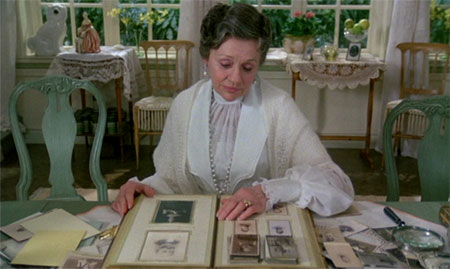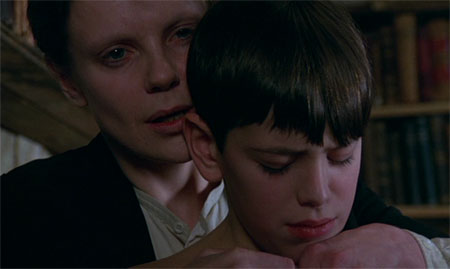A part of this viewing list: Criterion Collection Spine #263: Ingmar Bergman’s Fanny och Alexander [Theatrical Version].

Although I’ve yet to see the five hour television version of this film, Fanny and Alexander seems an odd title for a film in which Fanny is little more than an afterthought foil to her brother Alexander. There are hints throughout the film, however, that shots that appear to be objective might actually be first-person point of view. The film does its best to capture the cinematic equivalent atmosphere of the liminal stage of an adolescent rite of passage. While this is typically brief, the gradual emergence of an adolescent culture has lengthened this event to a years long transformation. Alexander is ahead of his time in this regard. The film takes place at the turn of the 19th century, and while Alexander’s adult family members are comfortable in their lifestyles, his alternating passive defiance and defeatism seems to presage the Modern horrors of the 20th century.

Basically he’s caught between the worst of the old and the worst of the new. After his father dies pitifully, there is a Hamlet referential space in which his mother remarries a Calvinist bishop whose unwelcome overly-familiar touch not only makes Alexander’s skin crawl, but the viewer’s as well. This authoritarian enforces a discipline that is markedly different than the liberal atmosphere of the Ekdahl matriarchy. In an environment that is proud of the fact that it has remained austerely unchanged for hundreds of years, Alexander begins to learn to use his particular talent for imagination and guile as a potent weapon. It is inevitable that he will have a showdown with the bishop. Alexander’s mouth is just as smart as mine was, when he decides to use it.

Despite his antagonism, both he and his mother lack the strength to escape. A friend of the family devises a stratagem to rescue the children, and it is only at this point, the climax of the film that it loses me. There are some deliberate continuity shifts that throw the whole created reality of the film into question. Since this occurs in such a key spot, it is hard to decide just what Alexander is, and where we are in relation to him. The film settles down again after this moment, and in the house of Uncle Isak, Alexander comes face to face with his future, in the person of the wild Ismael. Again the reality of the film is called into question, until eventually the only guides left come from the monologues of the Ekdahl men and the closing quote from August Strindberg. More on that when I review the television version. [As a note to myself.]

• Criterion Review by Rick Moody.
• Deep Focus review.
• 1983 Roger Ebert review.
• 2004 Roger Ebert review.
• Alternative Film Guide review.
• YouTube clip.